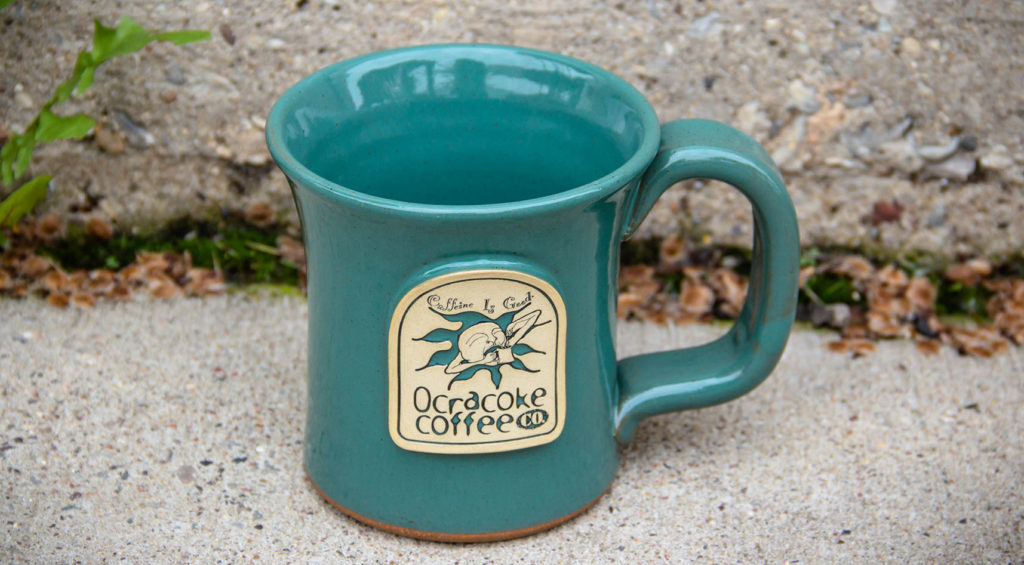
Custom Promotional Products
Almost every business uses custom promotional products in some form or another. Whether you’re just starting your first business venture or you’re looking for something new, there are a lot of choices to make for your products.
- Why Do I Need Custom Promotional Products?
- Common Types of Promotional Products
- How to Customize Promotional Products
- What to Look for in Promotional Products and Providers
- How to Use Your Promotional Products
Why Do I Need Custom Promotional Products?
Promotional products are items customized with your brand or logo. They can range from being very cheap and designed for use at events or higher quality as gifts for clients. Likewise, some products—like hipster-friendly fanny packs—stand out more than others—like T-shirts or water bottles.
Your company, whether it’s a multinational grain supplier or a bed & breakfast, needs promotional merchandise. It’s the best way to get your brand and name in front of new eyes. That merchandise helps your brand recognition and builds loyalty to your business over time.
Common Types of Promotional Products
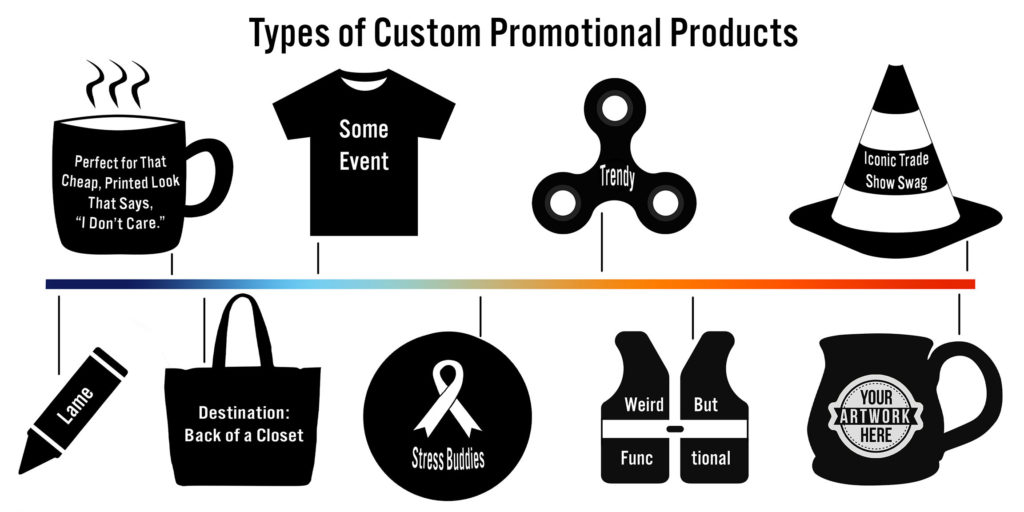
Pens
Have you ever taken a free pen from a hotel, or the bank? Pens are one of the most popular promotional products out there. You can huge quantities of them for cheap through suppliers and have them on hand for anyone to use. In most cases, the manufacturer will print the design you want onto the side of the pen, so you can easily get your business name and logo onto it.
However, the catch with pens is that they’re more likely to arrive defective or get lost. Part of the reason they’re so cheap is because a good portion of them won’t work. Keep this in mind when you’re looking to use pens as part of a gift package for your clients or employees.
Shirts

T-shirts are the weapon of choice at trade shows and conferences across the country. While not as cheap to make as pens, they’re diverse and have a lot of real estate for showing off your brand, artwork or inspirational quotes. They’re also great as uniforms for your team to wear at work.
However, T-shirts wear out. They can last for 10 years or for 10 hours, depending on the quality of the fabric. Not to mention, their brand recognition can fall significantly if your shirts end up being used for painting or torn up as rags for dusting.
There’s also a huge range in the quality, feel and cut of T-shirts, all of which are subject to trends coming and going. The cheapest shirts to produce feel heavier and are typically made of a cotton blend. They can also feel rough when you wear them, making them less appealing. However, some suppliers are switching to softer tri-blends with cotton, polyester and rayon. They’re a little more expensive to produce, but they’re great if you want them to last longer.
Notebooks
If you’ve ever been to a seminar or a conference, you’ve probably received a branded notebook. Most are college ruled and useful for taking notes at those seminars. However, if you write notes as an organizational tool, they can also be a lifesaver long after the conference is over.
Sometimes, these come with pens included. They’re great for people who want to take notes from your keynote speaker, or perhaps doodle pictures of Godzilla attacking the skyscraper in which your conference takes place. Either way, your recipients will use them.
Notebooks can last a long time, but that depends on how many notes your recipients take. Do they prefer to take notes and write to-do lists digitally? Then they might last for years—or get put into the back of a drawer only to be pulled out years later, after your branding has changed.
Bags
The biggest appeal with tote bags and drawstring bags is that you can pair them with other promotional swag. They can carry all of the previously mentioned products for gift packages.
But, most people don’t use promotional bags on a regular basis. In fact, you might get less exposure for your money than you’d like because people tend to take these home, throw them into a closet and forget about them. If you’re going to use bags for your branding, look for functional pieces like backpacks or lunch boxes. These stand out more, and they’re more likely to be used.
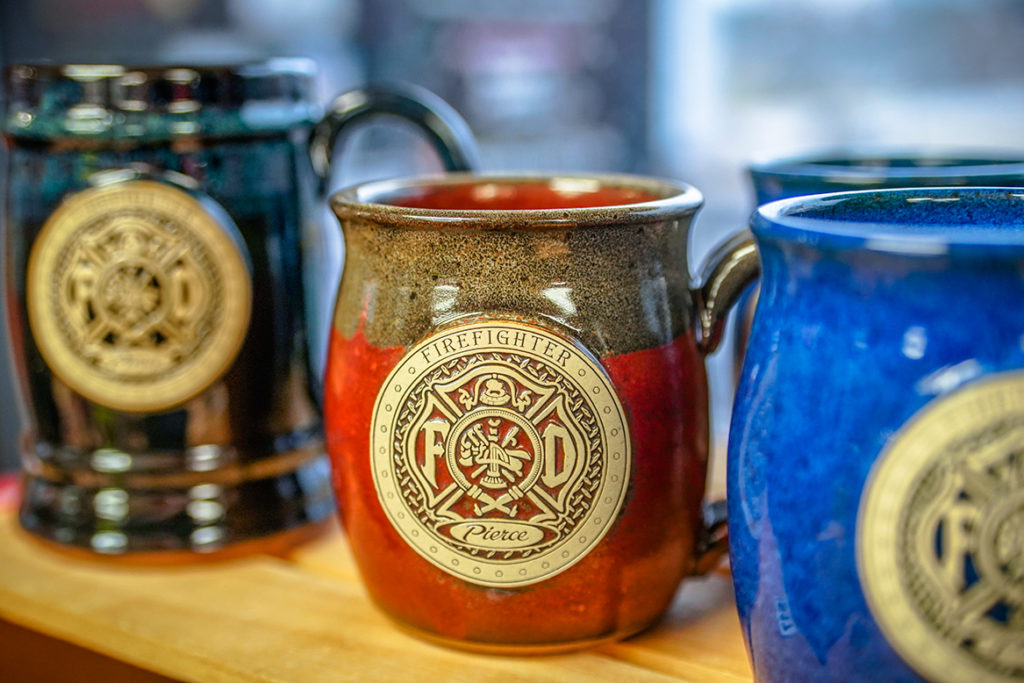 Custom Coffee Mugs and Drinkware
Custom Coffee Mugs and Drinkware
Coffee mugs are a perfect way to leave a lasting impression. Whether they’re mass-produced and printed or handcrafted from start to finish, custom coffee mugs can be a functional promotional product your customers, clients or coworkers can use every day. That’s also why so many places, including national park gift shops and manufacturing giants, offer them in their stores.
However, if you want to show you care about quality, prepare to pay more. Mugs like those from Sunset Hill Stoneware that you’ll find in America’s parks and historic places are handcrafted in the USA. However, since they are of premium quality, they also have a premium price. But, they also take the saying, “They don’t make them like they used to,” and turn it on its head. These mugs are also safe in the microwave, oven and dishwasher. Since they literally set your artwork in stone on the side of the mug, you also don’t have to worry about wear and tear.
Stoneware coffee mugs last through years of everyday use, so your brand will stick around while your customer uses their new favorite mug every day.
Less Common Promotional Products
Of course, shirts and pens are great, but they’re also boring, especially after getting them for the ninth time. If you’re trying to leave a lasting impression with some unique products for your shop, use the following instead:
- Fanny Packs. We’re begging you; make them mainstream again so hipsters will stop wearing them ironically.
- Tire Pressure Gauges. When your clients inevitably end up forgetting them in their glove compartment after your next conference, your name will be forever associated with fixing their flat tires, to their relief.
- Multipurpose Toolkits. That pocket knife or travel screwdriver will leave a lasting impression on your customers. Just make sure none of them try to put it in their carry-on luggage if they’re flying home from meeting you.
- Planters. For the more eco-friendly approach to long-term marketing. This one’s good if your client has a green thumb, but it might send a bad message if their plants don’t grow or they manage to kill them.
- Poker chips. Have a friend who likes going to casinos but hates the chip colors that the house uses? This one is for people like them.
- Shot Glasses. But go a step further than etched glassware. Find stoneware shot glasses, because they’ll stand out even after your fourth round of whatever you put into them.
Almost anything can be a promotional product, as long as you decorate it with your logo or artwork. But, there are even better ways to leave a memorable impression, by putting quality above all else. After all, choosing a premium product to give as a gift shows that you care, both about good impressions and the person receiving it.
How to Customize Promotional Products
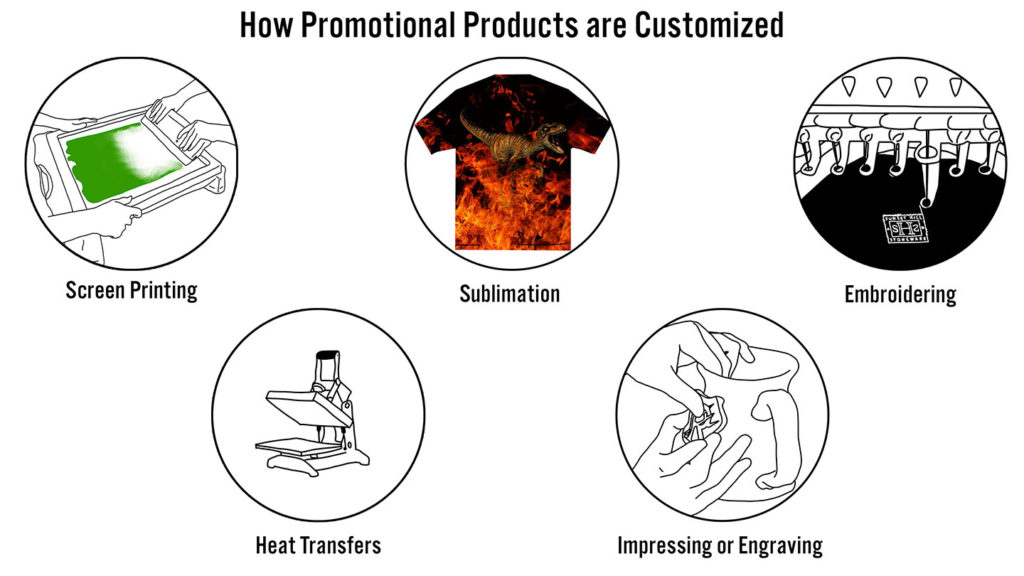
There are lots of different ways to decorate promotional products. Listed here are some of the most common ways to decorate custom promotional products with your logo or any artwork you can imagine. We’ve also included the benefits and drawbacks of each one.
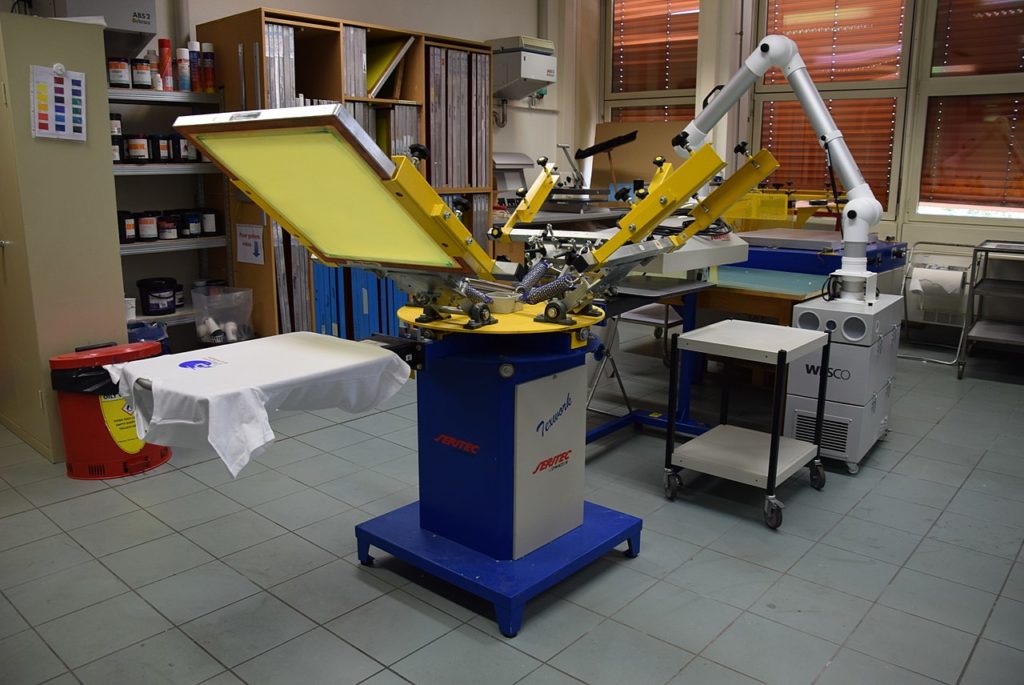 Screen Printing
Screen Printing
The process starts with the decorator creating a stencil of your design on a mesh screen, developing it with photosensitive chemicals that become solid in bright light. The decorator then washes away the hardened chemicals that aren’t covering the design, forming the stencil. Then, the decorator places the screen onto the printing machine.
Next, the decorator places your shirt onto a jig—a device that looks like a pizza peel. They lower the screen onto the shirt and, using a squeegee, pull thick, paint-like ink across the stencil. The ink passes through any hole that’s part of your design. If your design has multiple colors, the decorator repeats this process as many times as necessary, then dries the shirt so the ink can set. If you’ve ordered multiple shirts, the decorator starts the cycle over again until they’ve finished your order.
Screen printing can capture a lot of detail for your brand, including as many colors as the decorator has available. Some even offer metallic or glitter ink, if you’re looking for that extra sparkle. It’s versatile, since almost any promotional product under the sun can tolerate screen printed designs. Starting prices are typically low, too. However, there’s a catch.
Have you ever had the design on your favorite T-shirt crack because you washed it too many times? That’s common in screen printing, especially with heavier inks. Screen printed designs crack over time, whether it’s on a T-shirt or a printed glass.
Impressing and Engraving
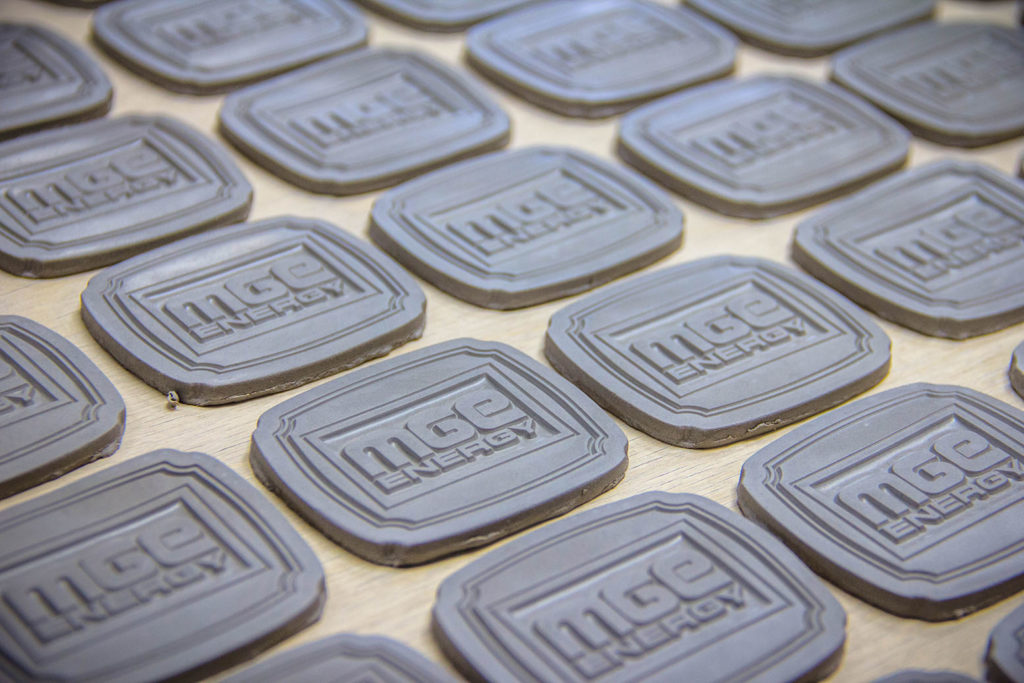
This sets your brand in stone. Some decorators use a laser, others like us use proprietary technology to capture as many fine lines and details as possible.
If your supplier has a laser, they can etch or engrave almost any material imaginable. Glass, wood, leather and even fabric work with this method. However, the downside to laser engraving and etching is that it burns some materials, and typically it can’t capture as many fine details as other methods.
There are several different methods for pressing your logo or unique artwork, most of which might involve clay, plaster of Paris or other materials that dry out. Some businesses might press the design into the clay using tools like stamps. Others use molds or dies to get the job done.
While pressing your logo or design is an excellent way to capture the details of your logo, artwork or iconography, there are limitations. Decorators can only do this with clay, metal, plaster and similar materials that start wet and finish dry. Shirts, stickers and other soft goods are out of the question.
Heat Transfers
Heat transfers are decals that decorators put on your promotional products with a heat press. It’s the same principle as adding iron-on patches to your clothes, but it’s done at scale with better consistency.
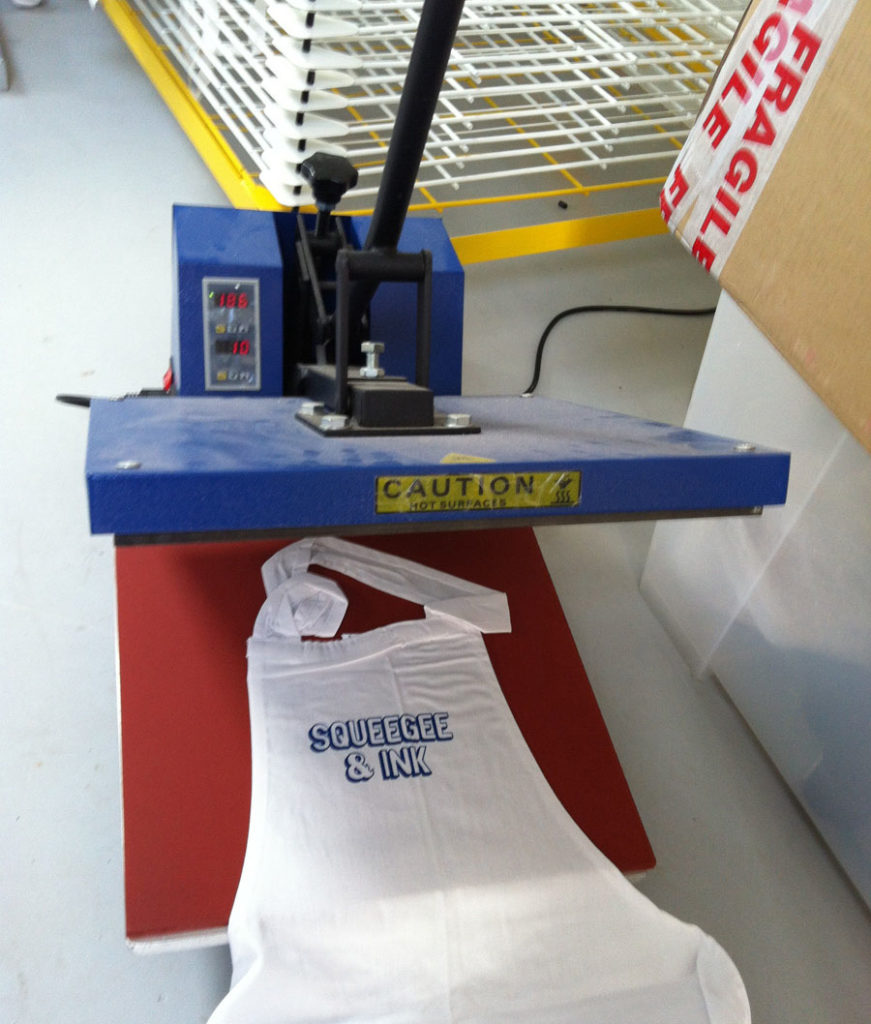 There’s a huge array of options for heat transfers, all of which start with special heat transfer paper or vinyl. The decorator puts your promotional product onto the heat press and centers your logo, printed or cut from transfer paper or vinyl, before lowering the top of the press onto the shirt. The heat binds the design to the shirt or bag; and with that, it’s finished.
There’s a huge array of options for heat transfers, all of which start with special heat transfer paper or vinyl. The decorator puts your promotional product onto the heat press and centers your logo, printed or cut from transfer paper or vinyl, before lowering the top of the press onto the shirt. The heat binds the design to the shirt or bag; and with that, it’s finished.
Think of the process as like putting a sandwich into a panini press, only your product is the sandwich and your design is the cheese.
Heat pressing designs allows for dozens of different options. On top of vinyl and printed designs, decorators also use a heat press to apply rhinestones, embroidered patches, sleek sublimated designs and much more. If you want to get creative with your promotional products, heat transfers allow for a lot of different options and even mixed media designs, if your decorator has the equipment.
Heat transfers are also great for making promotional products at events, because the equipment is portable. If you’re hosting a race and want to offer a variety of design options to your runners, having heat transfers allows you to do that.
The catch is that heat transfers can feel heavy and not breathe very well on T-shirts. Plus, if you’re dead set on having polyester shirts made for your team, your decorator may need to use an extra layer of material beneath the decal so it doesn’t burn the shirt.
Direct-to-Product Printing
Decorators call this direct-to-garment or direct-to-substrate printing. It’s the same process you use to print on paper at home, but instead they do it with shirts, glass, thermoses, canvas and more.
Designers and decorators have used direct-to-product printing within the last few years to roll out some very creative designs with soft finishes. It’s a good way to get an all-over effect with a lot of crisp details, and some like to show what they can do with some genuinely weird and wonderful artwork.
The catch is that direct-to-product printing is expensive and time-consuming, especially for larger orders. Plus, most printers can only print on white, so you’re limited to either using white products or paying extra for the decorator to lay down a layer of white so your design shows through.
Embroidering
It’s just like what you had to do in home economics class, but not miserable or for a grade. In terms of decorating promotional products, embroidery involves using a machine to add your logo to a shirt, jacket or bag with thread.
Embroidery gives your promotional products an air of quality. It’s a popular choice on polo shirts and backpacks, especially if you want to have a product that will last for years. On the other hand, embroidery is a trend that can come and go. Shirts decorated with your beekeeping association’s logo might look great when you receive them, but they’ll look dated a few years later.
Furthermore, be aware that the backing that embroiderers use to keep the product stable can feel heavy and itchy on clothes. Be sure to ask your embroiderer what they can do to reduce this if you know it’s going to be an issue on your shirts.
What to Look for in Promotional Products and Providers
Practically every town has a print shop or other decorator that offers custom products. However, you want to make sure that you’re getting the service and value that best suits your business. Here are some factors to think about when you’re looking for a provider.
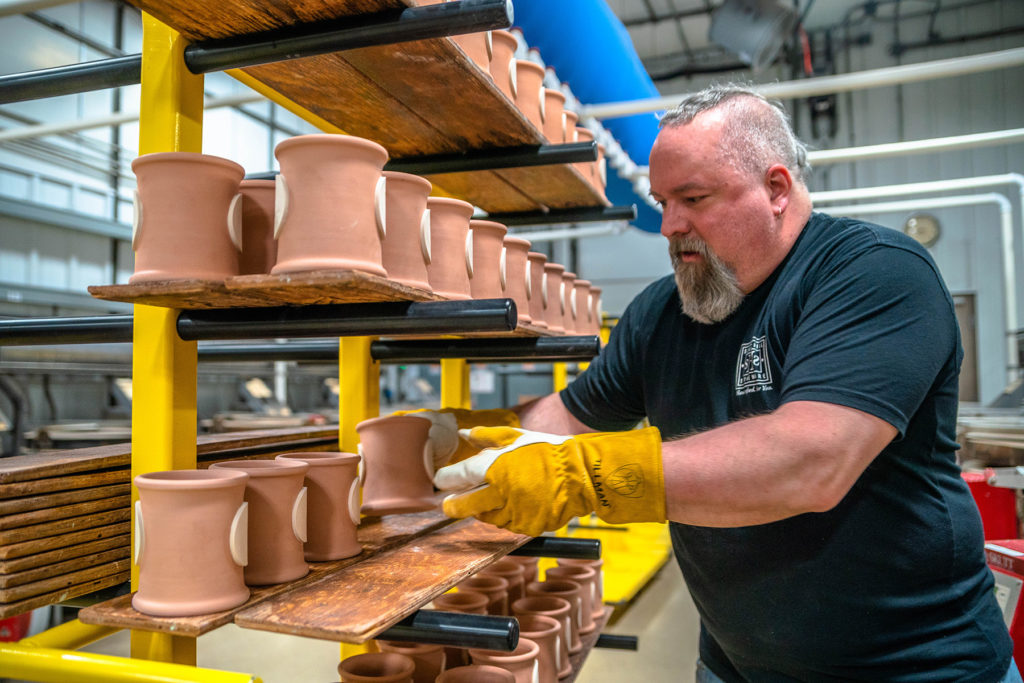
Where It’s Made
Check to be sure your products are responsibly sourced. While it’s not always realistic to have all of your products made domestically, be they mugs for your coffee shop or glasses for your brewery, there are plenty of providers in the United States that care about their employees and give them fair working conditions, from Idaho to Georgia and beyond. It’s even better if they make it locally, right in your state or your hometown.
American-made products are a safe bet if you want to ensure quality from a business that cares about paying its men and women fair wages and providing safe working conditions. Since our stoneware coffee mugs are handcrafted in America, you can guarantee that your product comes from skilled artisans.
Quality
You don’t want your shirts to have holes after one wear. Likewise, you don’t want pens that won’t write or flashlights that break after one use. What does that say if you’re giving them to your employees, or a potential customer?
If you’re just looking for a product to have on display to hand out at trade shows, you might be able to afford to go with lower quality. If you want to keep your employees, customers or clients for the long term though, a higher quality product will show you care about them.
Price
There are promotional products for practically any budget. But, the phrase, “you get what you pay for,” applies here. While not always the case, if you pay more for a quality product, your recipients will notice that quality, too. At the same time, if you choose a product because it’s cheaper, the quality will be lower, too.
Although Sunset Hill Stoneware’s custom coffee mugs may not be as inexpensive as pens or shirts, our quality is premium. We make our mugs using an art form that’s thousands of years old and design them to last just as long.
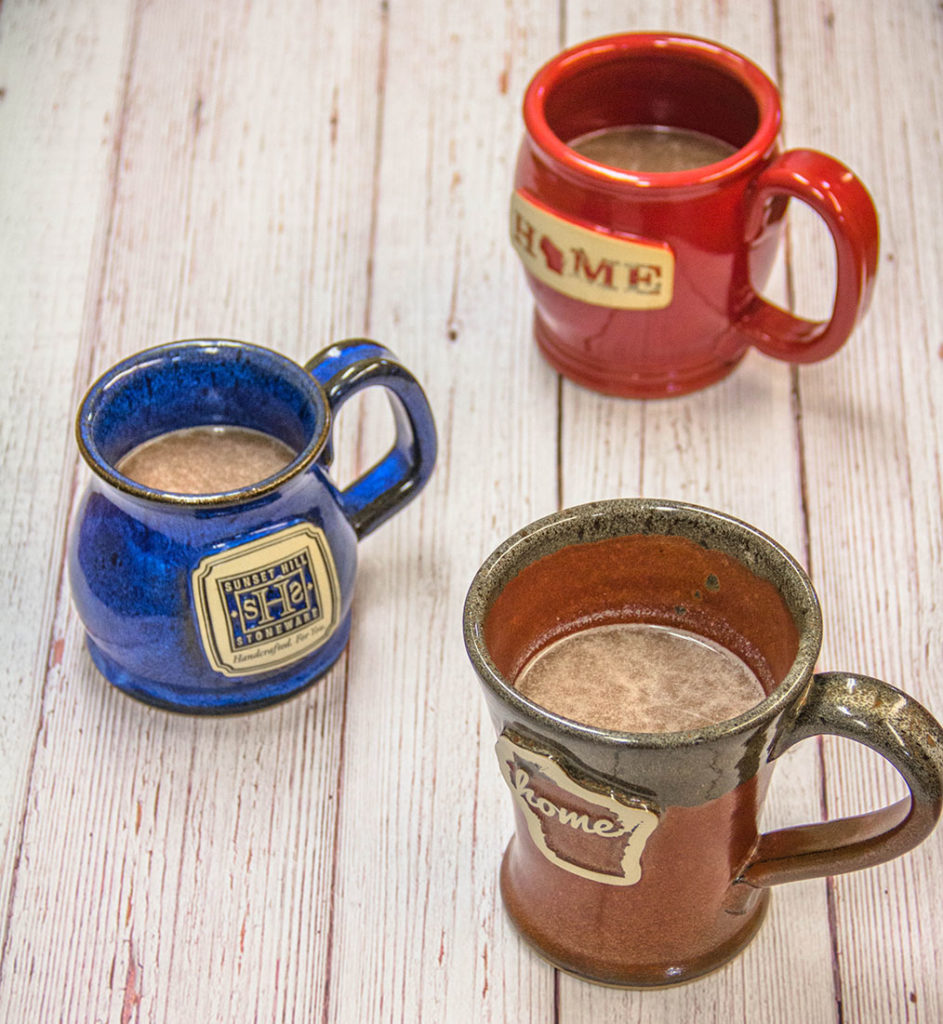
Functionality
It’s a better value for your investment if your recipients actually use your product. Tote bags end up in closets for years. Promotional T-shirts often become pajamas or paint clothes. Even golf umbrellas might sit in the back of a closet for months during dry spells.
Coffee mugs are something your recipients can use every day, whether at work or at home. Whether they’re a coffee person, a tea person or they just need to stay hydrated, your custom mug gives them a way to do that. We’ve had some customers tell us they use their mugs every single day, except when they forget to put them in the dishwasher. It doesn’t get much more functional than that.
Turnaround Time
It defeats the purpose of having shirts or mugs ready for an event if they won’t be ready until four weeks after it ends. This leaves you with a few different options when you’re looking for products on a deadline:
- Order Products 3 Months in Advance. Or longer. Quite possibly longer. Better hope you remember to make that order for St. Patrick’s Day on time before Christmas, and that your order doesn’t get pushed back in production.
- Ask for Rush Delivery. Some places charge a pretty penny if you want to expedite your order, or have strict requirements for your products to go with it.
- Choose a Company That’s Already Fast. Sunset Hill Stoneware is one of the fastest places in pottery. Although we also offer Priority in Production in a pinch, we can already get your beer mugs and coffee mugs to you faster than anyone else.
Sunset Hill Stoneware prides itself on having one of the fastest delivery rates in its industry. Of course you should always plan ahead if you want to have custom coffee mugs for your event, your military unit’s annual reunion or as a gift during the holidays, but we’ll give you what you need faster than any other provider.
How to Use Your Custom Promotional Products
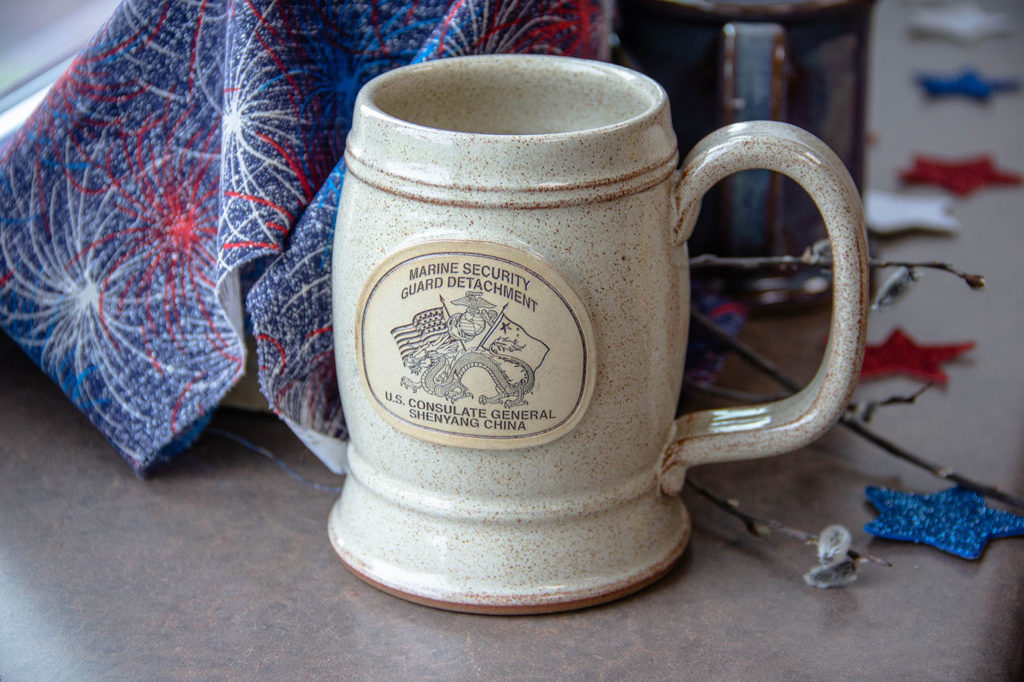 Custom promotional products are one of the most effective ways to market in the long term. Think of them as like a billboard you can hold in the palm of your hand. They’re good for more than just advertising though.
Custom promotional products are one of the most effective ways to market in the long term. Think of them as like a billboard you can hold in the palm of your hand. They’re good for more than just advertising though.
Promotional Products as Gifts
Did your team manage to double their production or increase sales this year? This is the perfect opportunity to give them a branded corporate gift. This is where quality gifts like custom coffee mugs, beer steins or other unique promotional products can come in handy.
Gifts like these are also great to give to potential clients. Is a customer coming to meet you for the first time? Giving them a custom, handcrafted mug with your logo could seal the deal. The possibilities are endless, but they all lead back to showing the recipient you care.
The Ultimate Long-Term Marketing Tool
Custom logo mugs and other products are like having a billboard you can wear or hold. Even if the people who see it aren’t actively looking for your product or service or trying to visit your museum, your branding plants a seed in the back of their mind.
Using quality products like stoneware coffee mugs lets that branding last potentially for years. Whether it’s the morning you give them to a potential new hire or five years after you first met your biggest client and give them a seasonal gift, your brand is still visible to anyone who sees that mug.
Improving Brand Loyalty
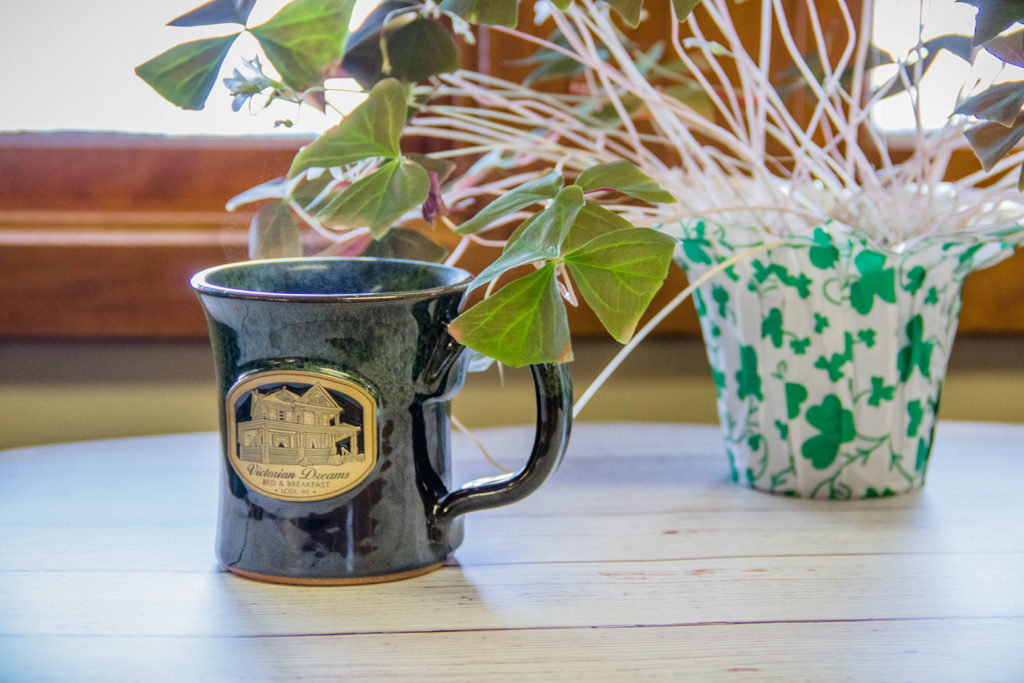 Maintaining existing customers is critical to every business. One of the things you can do to keep the clients you have is find little ways to let them know they’re important to you, such as providing them with handmade, branded mugs next time you meet up for breakfast.
Maintaining existing customers is critical to every business. One of the things you can do to keep the clients you have is find little ways to let them know they’re important to you, such as providing them with handmade, branded mugs next time you meet up for breakfast.
A small gift like that can have a huge impact down the line. Try sending mugs with your branding or some custom artwork to a long-time customer. They’ll think more highly of your business and feel valued in the process.
Boost Your ROI
With the right promotional product, whether it’s a sweatshirt with an unforgettable design or a branded mug that has quality you can feel, you can improve your ROI.
Trade shows are a huge investment for any business, but it helps to come prepared. Having a quality promotional product will make your business stand out in a crowd of other products and might even land you more prospects than you would’ve gotten otherwise.
No matter what you choose to use, custom promotional products are a vital part of helping your business grow and bringing your team together. Having a quality product with your branding makes your investment that much more effective. Whether you’re making the decisions or bringing this information to someone else who does, use this guide to help your business grow today.


[…] are many options in the custom promotional products market. However, a high-quality promotional mug will turn heads time and again, making your brand […]